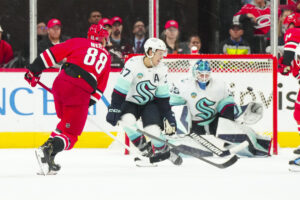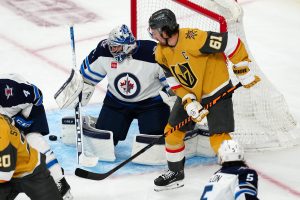San Jose Sharks head coach Peter DeBoer answers media questions almost daily during the preseason. But some of his answers have proven troubling. His September 16 question and answer session proved especially troubling.
Will Peter DeBoer Repeat His History?
Sharks fans have reason to look at their team with hope. They’ve been in the playoffs in 14 of the last 15 seasons. And reason for despair. They’ve never seen their team win a Stanley Cup despite being in the mix in most of these seasons.
The Sharks need a head coach able to take a good roster and turn it into a great team at the right time. DeBoer has taken good rosters and delivered good results, but this isn’t enough when the task is winning a Stanley Cup. He needs to give his team an edge. He must find ways to elevate the team. This means being smart with the risks he takes.
This season, the Sharks roster has taken a step back which means other elements need to take a step forward. Alas, DeBoer’s words indicate he isn’t taking steps he needs to take.
Joe Thornton Question
The first question DeBoer answered poorly was about Joe Thornton. The Sharks legend is 40 this season. He had a productive season in 2018-19. The days of Thornton playing top line centre have passed, but in a third-line role last season, he was quite good. In particular, he helped elevate the game of wingers Marcus Sorensen and Kevin Labanc. Both delivered major improvements in productivity.
The combination of age and two major ligament repair surgeries, one on each knee, led to a reduced role for Thornton in 2018-19. He averaged just over 15 minutes per game, playing in 73 games. The games he missed last season came early on, when knee issues forced him off the ice for a few weeks.
Thornton is healthier coming into this season. For the first time in three seasons, he begins the year with no surgery to recover from. DeBoer was asked if he’d give Thornton time off during the season, specifically when games occur on back-to-back nights.
DeBoer indicated the subject had been broached, which is a good sign. But the money part of the answer was a disaster, “I think it’s just going to depend on how he feels … there’s not many days he’s going to come to me and say he doesn’t want to go…”
Joe Thornton isn’t a player who takes himself out of the line-up. He skated in the 2017 playoffs on a knee with three torn ligaments. He’s wired to play. Leaving the decision to the athlete is a bad idea.
Peter DeBoer and Responsibility
The responsibility belongs to the coach. Completely. For Thornton, an ounce of prevention is worth a pound of cure.
DeBoer has to be pro-active here, not reactive. Thornton’s knee injuries both came in ‘third game in four nights’ situations. Did fatigue play a role? Probably. Can DeBoer avoid playing Thornton in these situations? For the most part, yes.
Thornton’s playing time has been reduced, so the fatigue risks are less. But DeBoer can’t wait until fatigue hits Thornton before giving him a game off. Picking the games he is most vulnerable should do fine. I did a study of Thornton’s productivity a few years back (prior to the knee injuries), and ‘third game in four nights’ were well below average for him. I doubt it has gotten better with age.
Done wisely, Thornton misses no more than a handful of games. Let him sit games he is most vulnerable to injury and most vulnerable to declining play. The coach is the person responsible for this. Not the player. This isn’t a mutual decision. When the Sharks play three games in four nights, Thornton takes one of the games off. If this can’t be done for some reason, DeBoer can cut back on Thornton’s minutes in the games.
The coach needs to be smart. He needs to own this issue. His answer didn’t.
Load Management
Full confession here. I’d already drafted the article in my mind. The working title was “Peter DeBoer, Kawhi Leonard and Load Management.” I’d intended to write the article closer to the start of the season. But since DeBoer gave his answer on the subject, I’ll address it now.
Load management is a recent term for an old concept. This season, it was used in the NBA. More specifically, it was applied to Leonard. He finished the 2018-19 season with both an NBA title and the playoff MVP award. Nice hardware. After the season, he credited the process of load management for allowing him to play effectively for the entire season. In practice, this meant taking a substantial number of games off, enabling him to stay healthy and strong for the entire regular season. The process placed a premium on being healthy and strong for the playoffs. It worked.
As mentioned, the concept is not new. One longstanding example of load management is in baseball, where pitchers are routinely on a pitch count. A pitch count is where a pitcher is given a limit to the number of pitches he can throw in a game. The intent is to reduce strain on the pitching arm. The goal is essentially identical as with Leonard in the NBA – give the player the best chance to be healthy and strong over the longer haul. This is most rigorously applied to pitchers recovering from an injury.
Peter DeBoer and Load Management
In hockey, an analog to pitch count is to limit the ice time of a star player upon his return from injury. DeBoer made it obvious last season he doesn’t believe in the load management concept with his handling of Erik Karlsson. Upon his February return from a January injury, DeBoer had Karlsson skate 24 minutes his first game back and 28 minutes in his next game back. Karlsson was re-injured in his third game back. Lesson learned? Apparently not.
The Thornton question was a specific load management question about a specific player. The question following the Thornton question was about load management more broadly; asking DeBoer if there was anything he might learn from the application of load management in the NBA.
DeBoer’s answer began with the unfortunate words “I don’t know, we’re different” and it went downhill from there. He cited a difference in the load top NHL players have compared to top NBA players, based on playing time. Then he went on to cite his own forms of load management “how we practice and … when to practice and when to have time off …”
Cue the screams. The answer was disturbingly bad. NHL players may play fewer minutes, but they are sprinting more often. There is plenty of contact in the NBA, but there is much more in the NHL. Players in the NBA get tossed out of games for the type of contact which NHL officials routinely ignore. The playing time parallel is absurd.
Recent Sharks History
This is a coach whose teams have collapsed in March twice in the last three seasons. The roster has the league’s second oldest player in a key role, a 35-year-old defenceman who last season played more minutes than any other NHL skater (regular season + playoffs) and their best player is coming off a serious injury. This is a team ripe for load management. Yet, for some bizarre reason, DeBoer seems stuck in his own world, never adapting, never learning.
Best Practices
Best practices is a business concept. It seeks the best ways to do things. It isn’t limited to internal learning, but learning from wherever better ideas may reside. Can Peter DeBoer learn from another championship team? Apparently not because “we’re different.”
At points along the way, I suggested NHL coaches could learn from the NBA’s Gregg Popovich who practiced load management in his own way. He sent his starters home instead of playing them in a regular season game in 2012. The league fined him for this. Popovich understood the regular season game had comparatively little meaning compared to the playoffs. He rested his players and his San Antonio Spurs team won the NBA title the same season. Now Popovich’s approach is widely used for the simplest of reasons – it works. If anything, the case for adapting this approach to the NHL is far greater in the NHL. At least in the NBA, earning a higher seed provides a meaningful benefit. In the NHL, it does not.
Sharks Culture
There is one more troubling aspect to DeBoer’s answer. The Sharks organization believes there is much to be learned from other sports. Sharks general manager Doug Wilson often cites things he learned from football legend Bill Walsh (San Francisco 49ers Hall-of-Fame coach and general manager). When Wilson mentions Walsh, it’s with reverence and appreciation for the insights he offered.
But this is hardly the only occasion the Sharks have taken from other sports. The Sharks added a new scout just a few weeks back by the name of Ned Colletti. Colletti was a general manager himself for a decade and held various executive roles for over 20 years. Except Colletti did this for baseball teams, notably the Los Angeles Dodgers and San Francisco Giants. Wilson believes Colletti expertise with talented athletes combined with executive thinking can provide the Sharks an edge.
Culturally, the Sharks demonstrate they are willing to learn from others – both inside and outside the game of hockey. Peter DeBoer, however, appears stuck within his own box.
Peter DeBoer and Unlearned Lessons
There’s a broad consensus on this point; the health of an NHL team has a lot to do with its prospects in the playoffs. Techniques such as load management can help a team to stay strong through the long and often brutal regular season. This enables the team to enter the playoffs with the best chance of success. It’s a lesson DeBoer refuses to learn. Disappointingly, this is an area where management seems unwilling to push the coach.
DeBoer cited analytics as one of the items which made the Sharks job attractive when he was hired in 2015. Yet, information, even simple information, seems to elude him (we covered several items in our 2018-19 season review of DeBoer). A new season is around the corner, but lessons available to the Sharks coach have gone unlearned.
I understand I’m parsing words which perhaps shouldn’t be taken too seriously. DeBoer could wake up one morning and change his approach. Yet these are areas DeBoer has compromised prior teams, including last season’s team, and there’s no sign he is evolving. As in previous seasons, Peter DeBoer appears set to stack the odds against his own team.
Main Photo:






